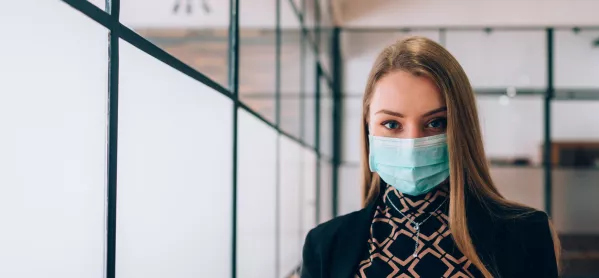Clinically vulnerable teachers are safe to work in schools, provided social distancing measures are in place, the schools minister has said.
Addressing the education committee this morning, Nick Gibb said schools should be able to ask clinically vulnerable staff - those who are at a higher risk of severe illness from coronavirus - to come back to work at school.
Official government guidance states that education settings should endeavour to ask clinically vulnerable individuals to work from home where possible.
Schools reopening: Track and trace ‘needed for openings’
Coronavirus: Chances of track and trace by 1 June ‘virtually nil’
Background: Scientists fuel revolt against 1 June school openings
Clinically vulnerable people are at a “higher risk of severe illness from coronavirus”. They include pregnant women; anyone with chronic mild to moderate respiratory diseases; and people with diabetes, for example.
They are different to people who are clinically extremely vulnerable. These people are at a “very high risk of severe illness from coronavirus”, and include those who have had solid organ transplants, for example. Clinically extremely vulnerable people have been advised to stay at home and continue shielding measures.
Asked by education committee chair Robert Halfon if schools should be asking staff who have been defined as clinically vulnerable (Category B) to come into work, Mr Gibb said this would be safe, provided the school had put social distancing measures in place.
“If they are clinically vulnerable then it is safe, provided, of course, that the school is doing everything it can to ensure that there’s social distancing happening,” he said.
Coronavirus: Protecting clinically vulnerable school staff
Asked to clarify if this means that “schools should be able to acquire those clinically vulnerable teachers and support staff to come in”, Mr Gibb said: “Provided the school is able to ensure there is social distancing at the school.”
But staff who have extremely clinically vulnerable people at home should not “necessarily” return to school, he added.
Mr Gibb said: “What we’ve said is that if staff or, indeed, pupils have people at home who are clinically extremely vulnerable, then not to necessarily return to school.”
Official government guidance states: “Clinically vulnerable individuals who are at higher risk of severe illness (for example, people with some pre-existing conditions as set out in the Staying at home and away from others (social distancing) guidance have been advised to take extra care in observing social distancing and should work from home where possible.
“Education and childcare settings should endeavour to support this, for example by asking staff to support remote education, and carry out lesson planning or other roles which can be done from home.
“If clinically vulnerable (but not clinically extremely vulnerable) individuals cannot work from home, they should be offered the safest available on-site roles, staying two metres away from others wherever possible, although the individual may choose to take on a role that does not allow for this distance if they prefer to do so.”




